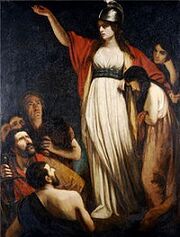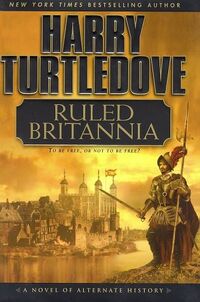For the ancient British queen, see Boudicca of the Iceni

A late 17th century performance of Shakespeare's Boudicca.
Boudicca was a play written by William Shakespeare under contract by Sir William Cecil. It was performed by Lord Westmorland's Men as part of Cecil's plot to overthrow Queen Isabella and King Albert of England and restore Queen Elizabeth to the throne, debuting at The Theatre on 13 October 1598.
It tells the story of Boudicca, the ancient Queen of the British tribe known as the Iceni, and glorifies her struggle against the Roman occupiers of Britain.
In Boudicca, Boudicca was designed, both by character and by costume, to resemble the then-deposed Queen Elizabeth. The story follows the Iceni army from its humble beginnings when it first revolts against the Romans through a series of victories before Boudicca, inspired to overconfidence and against the advice of her right hand man General Caratach, overextends her forces and endures a hard reversal of fortune. In the final scene, Gaius Suetonius Paulinus executes Boudicca, but not before the queen defiantly prophesies that "a thousand years and more hence" another queen would rule in Britain, one who would finish what she had started and bring the island's people to the glory and dominance they deserved--a clear reference to Elizabeth.
After Boudicca's dramatic death scene, which brought the audience, alternately, to tears and stunned silence when the play debuted, Shakespeare himself delivered the following rhymed couplet: "No epilogue here, unless you make it/If you want your freedom, go and take it." When the play debuted, that couplet inspired the audience to storm the Tower of London and liberate Elizabeth.
After Elizabeth was restored to the throne, she visited The Theatre to see an encore performance of Boudicca.[1] Following the performance, she promised to become the patron of Lord Westmorland's Men (thereafter known as The Queen's Men) and knighted Shakespeare.
Literary Note
Harry Turtledove's version of Boudicca is based primarily on Bonduca, a 1613 play by Shakespeare's occasional co-author John Fletcher. It also incorporates passages from Henry VIII, Titus Andronicus and King John, also by Shakespeare, Christopher Marlowe's Tamburlaine the Great, and William Averell's An Exhortacion to all English Subjects. As the latter was written in prose, Turtledove took upon himself the task of setting those passages into iambic pentameter.
See also
References
| |||||||||||||||||||
